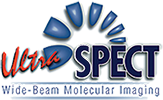Using Software from UltraSPECT, Busy Cardiology Practice Effectively Images Patients Using Lower Dose Imaging
Auburndale, Mass., November 25, 2013 – As the global medical Isotope shortage continues indefinitely following the plant leak in South Africa, Berks Cardiologists, Ltd., a full service cardiovascular imaging center in Central Pennsylvania, is continuing to operate at the same procedure volume and with their lower-dose cardiac nuclear medicine imaging protocols. The facility relies on software from UltraSPECT, a leading provider of image reconstruction technology that reduces radiopharmaceutical dose and acquisition time for nuclear medicine (NM) exams.
Berks Cardiologists is a private practice in Wyomissing, Penna. with a staff that includes 14 cardiologists and performs about 100 SPECT exams a week. The practice was initially looking for software to improve their image quality, and what they found was a solution that not only provides them with high quality resolution images, but the ability to use half the injected dose of the nuclear imaging agent Technetium-99m (Tc-99m). A shortage of the isotope has been prevalent since a plant leak at South Africa Nuclear Energy Corp in South Africa, the third largest global producer.
"Wide Beam Reconstruction technology from UltraSPECT has been instrumental in our ability to maintain our high patient throughput throughout this technetium shortage,” explained James Reibsane, CNMT, Director of Diagnostic and Technical Services at Berks Cardiologists. “With our protocol of low-dose imaging, our business operations continue, and our patients are all imaged as planned and as needed. Few cardiovascular imaging facilities across the country can say the same," continued Reibsane.
Shortages of Tc-99m can have significant impact on healthcare facilities’ operations and, more significantly, on the care of their patients. Without a solution like the low dose software from UltraSPECT, implications can include:
- The inability to provide patients with the necessary nuclear medicine tests
- Delays and rescheduling of exams for patients
- The need to send high risk patients for interventional procedures without the most necessary test results
- Loss of revenue to a practice
“Since the heavy shortage in 2009, it is known that nuclear isotope shortages are guaranteed to happen and are nearly always unexpected. For the best care of their patients, cardiology practices, hospitals and imaging centers alike all need to have a reliable solution in place to cope with such shortages. UltraSPECT provides the best and most cost-effective solution,said Yossi Srour, president and CEO, UltraSPECT. “Low dose protocols are needed now more than ever with the increase in these shortages combined with the ongoing implementation of low dose ASNC guidelines. UltraSPECT is proud to play a part in helping healthcare facilities provide the best patient care possible.”
UltraSPECT’s Xpress3.Cardiac™ solution uses the company’s exclusive WBRTM (Wide-Beam Reconstruction) technology to deliver half-dose cardiac imaging with high image quality and undiminished diagnostic certainty. It not only minimizes the radiation dose to the patients, but to the staff administering the exams as well.
For more information visit www.ultraspect.com or call 1-888-WBR-SCAN (1-888-927-7226).
About UltraSPECT:
UltraSPECT Inc. is a leading provider of image reconstruction products, dedicated to enhancing the performance of existing nuclear medicine gamma cameras and PET scanners. Based on proprietary, innovative reconstruction algorithms, UltraSPECT’s Wide-Beam Reconstruction (WBR™) solutions shorten acquisition times, lower radiation dose and increases image resolution. Xpress.Cardiac™ enables rest/stress study acquisition with either half the radiopharmaceutical dose or half the scan time, compared to conventional acquisition techniques. Xpress3.Cardiac™ offers simultaneous reduced-dose and reduced-time imaging, supporting increased patient safety and comfort.
# # #
Media Contact:
Courtney Kraemer
KNB Communications for UltraSPECT
Office: 203-504-8230 x137
Mobile: 203-253-3257
[email protected]
